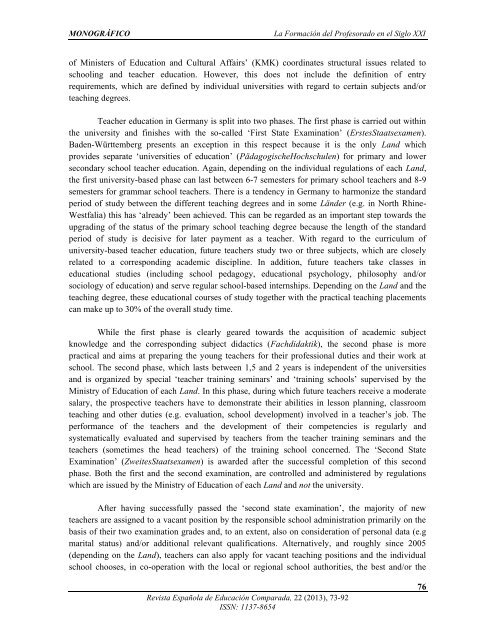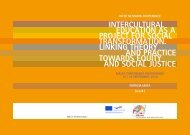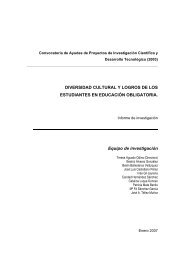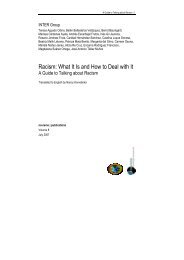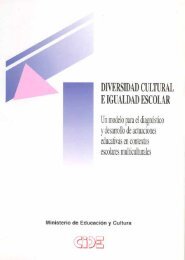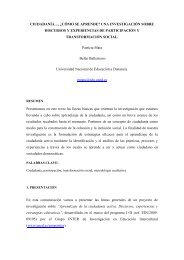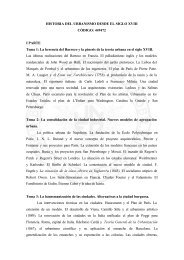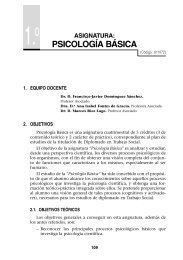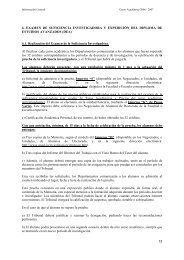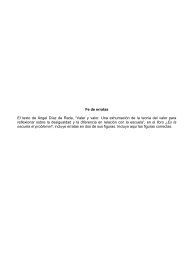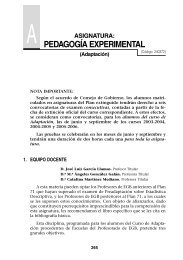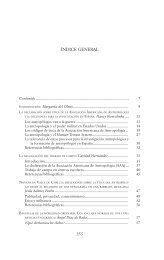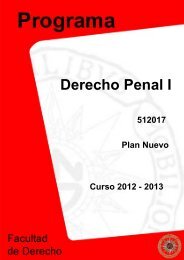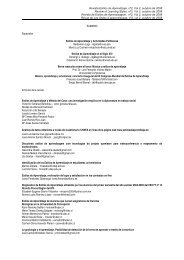'NEW' SOLUTIONS TO 'OLD' PROBLEMS? RECENT ... - UNED
'NEW' SOLUTIONS TO 'OLD' PROBLEMS? RECENT ... - UNED
'NEW' SOLUTIONS TO 'OLD' PROBLEMS? RECENT ... - UNED
Create successful ePaper yourself
Turn your PDF publications into a flip-book with our unique Google optimized e-Paper software.
MONOGRÁFICO<br />
La Formación del Profesorado en el Siglo XXI<br />
of Ministers of Education and Cultural Affairs’ (KMK) coordinates structural issues related to<br />
schooling and teacher education. However, this does not include the definition of entry<br />
requirements, which are defined by individual universities with regard to certain subjects and/or<br />
teaching degrees.<br />
Teacher education in Germany is split into two phases. The first phase is carried out within<br />
the university and finishes with the so-called ‘First State Examination’ (ErstesStaatsexamen).<br />
Baden-Württemberg presents an exception in this respect because it is the only Land which<br />
provides separate ‘universities of education’ (PädagogischeHochschulen) for primary and lower<br />
secondary school teacher education. Again, depending on the individual regulations of each Land,<br />
the first university-based phase can last between 6-7 semesters for primary school teachers and 8-9<br />
semesters for grammar school teachers. There is a tendency in Germany to harmonize the standard<br />
period of study between the different teaching degrees and in some Länder (e.g. in North Rhine-<br />
Westfalia) this has ‘already’ been achieved. This can be regarded as an important step towards the<br />
upgrading of the status of the primary school teaching degree because the length of the standard<br />
period of study is decisive for later payment as a teacher. With regard to the curriculum of<br />
university-based teacher education, future teachers study two or three subjects, which are closely<br />
related to a corresponding academic discipline. In addition, future teachers take classes in<br />
educational studies (including school pedagogy, educational psychology, philosophy and/or<br />
sociology of education) and serve regular school-based internships. Depending on the Land and the<br />
teaching degree, these educational courses of study together with the practical teaching placements<br />
can make up to 30% of the overall study time.<br />
While the first phase is clearly geared towards the acquisition of academic subject<br />
knowledge and the corresponding subject didactics (Fachdidaktik), the second phase is more<br />
practical and aims at preparing the young teachers for their professional duties and their work at<br />
school. The second phase, which lasts between 1,5 and 2 years is independent of the universities<br />
and is organized by special ‘teacher training seminars’ and ‘training schools’ supervised by the<br />
Ministry of Education of each Land. In this phase, during which future teachers receive a moderate<br />
salary, the prospective teachers have to demonstrate their abilities in lesson planning, classroom<br />
teaching and other duties (e.g. evaluation, school development) involved in a teacher’s job. The<br />
performance of the teachers and the development of their competencies is regularly and<br />
systematically evaluated and supervised by teachers from the teacher training seminars and the<br />
teachers (sometimes the head teachers) of the training school concerned. The ‘Second State<br />
Examination’ (ZweitesStaatsexamen) is awarded after the successful completion of this second<br />
phase. Both the first and the second examination, are controlled and administered by regulations<br />
which are issued by the Ministry of Education of each Land and not the university.<br />
After having successfully passed the ‘second state examination’, the majority of new<br />
teachers are assigned to a vacant position by the responsible school administration primarily on the<br />
basis of their two examination grades and, to an extent, also on consideration of personal data (e.g<br />
marital status) and/or additional relevant qualifications. Alternatively, and roughly since 2005<br />
(depending on the Land), teachers can also apply for vacant teaching positions and the individual<br />
school chooses, in co-operation with the local or regional school authorities, the best and/or the<br />
Revista Española de Educación Comparada, 22 (2013), 73-92<br />
ISSN: 1137-8654<br />
76


